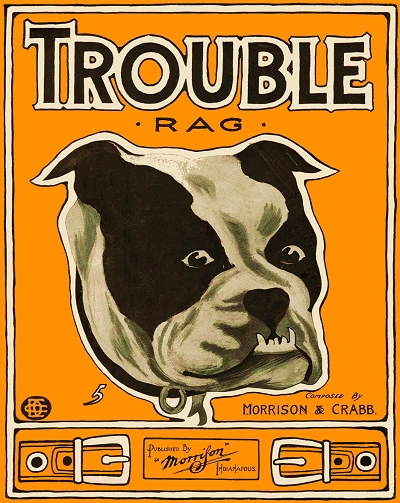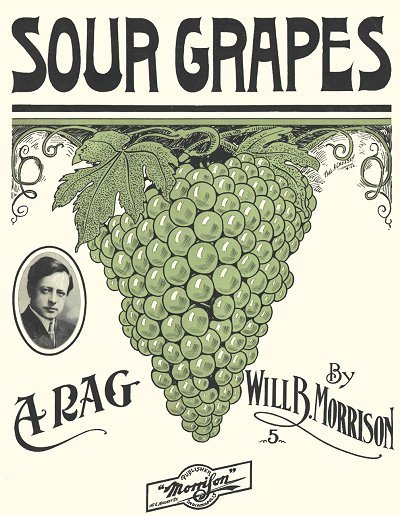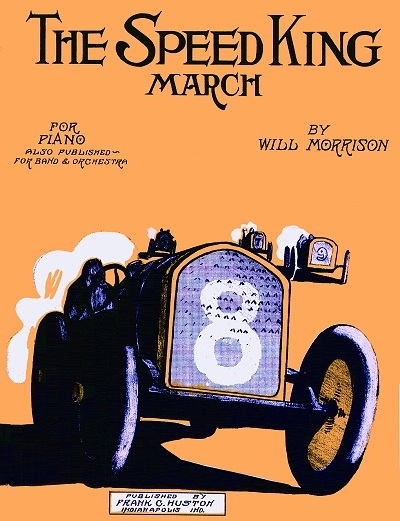
William Burdette Morrison (October 12, 1874 to December 18, 1937) | |
 Compositions Compositions | |
|
1898
Love and DutyThe Old School Bell Dance of the Sun Rays: Valse Impromptu 1899
Grant for Me This Little FavorMadeline Before the Lights Were Lit Don't Forsake Your Little Sweetheart 1900
Jolly Darkies: Cake WalkThe Cakewalk at Boomblestein's Ball Tribute to the Blue and Gray 1902
The Search Light: March1903
The Search Light: March Song [w/P.A.W.]
1905
The Ponies' Carnival1907
Love's Greeting: an Idyll1908
Flower LandJohnnie-Jump-Ups |
1908 (Cont)
Soubrette: WaltzDreams of Madrid: Novelette Trouble (Rag) [1] 1911
Candlelight ReverieScarecrow Rag 1912
If Dreams Come True [2]Sour Grapes Will O' the Wisp: Syncopated Waltzes 1911
Way of the World1914
Little MischiefPhiddlin' Phil Dream Days The Speed King March Mammy's Li'l Sugah Plum 1915
Belfry Chimes
1. w/Cecil Duane Crabb
2. w/J. Will Callahan |
 Arranged/Published Compositions Arranged/Published Compositions | |
|
1907
Fluffy Ruffles [Cecil Duane Crabb]1908
Honeymoon Rag [Abe Olman]The Princess [Russell Smith] G Whiz: Ragtime Two Step [Sam H. Ewing] 1909
Sparkles [Charles B. Ennis]1912
Reflection (A Meditation) [Francis McClure]1913
Traumerei: Syncopated Waltzes[Robert Schumann] Just a Little Tic-Tic on My Shoe [J.C. Alexander] Blow, Blow, Blow [J.C. Alexander] Melody in F [Anton Rubenstein] The Palms [Jean-Baptiste Faure] |
1914
Rosemary Waltzes [Earle E. Crooke]Eileen (From Old Killarney) [Allen Spurr] Helmaredi Waltzes [Helen Downs] I Love But Thee [M.W. Pittman] 1915
Humoreske: Syncopated Waltz[Anton Dvorak] Flower Song [Gustav Lange] Aloha Oe [Queen Lili'uoakalani] Come Where the Roses Dream [June Williamson & Lucile Thomas] Love's Old Sweet Song: Syncopated Waltzes [J.L. Molloy] Old Black Joe [Stephen Foster] I'm in Love with a Girl in New Hampshire [J.F. Cohen & Ed Mallory] Dancing at That Georgia Jubilee [J.F. Cohen] |
Will B. Morrison was an interesting figure in ragtime, less for his personal music contributions than for his drive and promotion, clearly with a passion for the music. While his role started out more as a composer, he ended up with some historical importance as a publisher, and finally an arranger. Will was born to Kentuckian John B. Morrison and Emma Morrison in rural Seymour, Indiana. His father shows up as a dry goods merchant in Indianapolis starting in the early 1890s, so the family was clearly in place there for Will's secondary schooling. What musical training or college he had is unclear, but he did have the capability to notate and arrange music, potentially the result of classes in piano, harmony and theory.
What musical training or college he had is unclear, but he did have the capability to notate and arrange music, potentially the result of classes in piano, harmony and theory.
 What musical training or college he had is unclear, but he did have the capability to notate and arrange music, potentially the result of classes in piano, harmony and theory.
What musical training or college he had is unclear, but he did have the capability to notate and arrange music, potentially the result of classes in piano, harmony and theory.As early as the late 1890s Will was clerking in a music store. The 1900 enumeration listed him as a music dealer living in Jackson, Indiana, around 60 miles southeast of Indianapolis. At age 25 he now had a wife of either 18 or 21 depending on the interpretation of multiple demographics. There is ambiguity in that census as his wife's name - Gertrude Morrison - is not entered, nor is his daughters', who was likely just a few weeks or less old when the record was taken. She was soon named Dorothy Marie. As per the 1910 record they were likely married in late 1899. At that time they lived just a few doors down from Will's parents.
In 1898 Will had an opportunity to expand beyond being a merchant, and to branch into writing, then publishing. He started with a couple of meager attempts at songwriting in 1898. After composing writing a rather average song in 1899, Before the Lights Were Lit, Morrison ventured into the syncopated format with Jolly Darkies, both pieces printed by another Indianapolis publisher although Before the Lights Were Lit was supposedly also printed in New York according to a period source. Will's first self-published piece was a 1900 cakewalk that was no better than average in its composition, but it established Morrison as a his own publisher for the short term. Around 1907 he was placed in charge of the sheet music department at the Carlin & Lennox department store in Indianapolis, which gave him a direct line to publishers and print jobbers.
After nine years of composing with only a handful of his pieces in print, one of them a children's tune, Will decided to try publishing again to help out a friend. He took on Fluffy Ruffles by Cecil Duane Crabb and put it into print in Indianapolis. This was the start of a short-lived and small publishing business, but a significant one given the pieces in his catalog. The following year he did the same for Abe Olman's first syncopated piece, Honeymoon Rag. This was likely the official launch of his enterprise, as a notice appeared in The Music Trade Review of November 28, 1908: "William Morrison has started a music publishing business in the Unity building, Indianapolis, Ind." This was likely a few months after he had already formed the label.
as a notice appeared in The Music Trade Review of November 28, 1908: "William Morrison has started a music publishing business in the Unity building, Indianapolis, Ind." This was likely a few months after he had already formed the label.
 as a notice appeared in The Music Trade Review of November 28, 1908: "William Morrison has started a music publishing business in the Unity building, Indianapolis, Ind." This was likely a few months after he had already formed the label.
as a notice appeared in The Music Trade Review of November 28, 1908: "William Morrison has started a music publishing business in the Unity building, Indianapolis, Ind." This was likely a few months after he had already formed the label.After his initial self-publishing experiences, Morrison also may have helped friends Paul Pratt and May Aufderheide with the first edition of her tune, Dusty Rag. This is not clear as Pratt often gets credit, but Morrison had the direct connections. May's father, John H. Aufderheide, took over publishing Dusty Rag and her subsequent pieces soon after. In mid-1908 Will started bringing out several of his own pieces, although nothing of too much significance. One of those was a rag called Trouble co-written with Crabb, and listed with Crabb as publisher on the first edition. However, it is probable that Morrison had a lot to do with this 1908 publication, such as engaging the print jobber, and his logo appears on subsequent printings.
As of 1910 Morrison was still listed as a dealer in a store, likely Carlin & Lenox, but added Musician to his credits, perhaps performing in Indianapolis as well. The family was also hosting his widowed father. In 1911, his first rag of note, Scarecrow Rag, was printed by John Aufderheide, who had better distribution at that time. Then in 1912 he put out Sour Grapes under his own logo, a fine piece that showed maturity as a composer in the ragtime format. Yet another piece, the waltz Will O' the Wisp, was given to a different Indianapolis publisher. Given that the investment in a printing a piece before it is even sold can be a considerable one, he may have shopped around to other publishers to raise the money to release certain pieces on his own. However, at this same time, Morrison seemed to be finding a different calling as an arranger. He had already been arranging pieces by some of his peers for his catalog, and helping one friend, J.C. Alexander, publish under his own name as well.
he may have shopped around to other publishers to raise the money to release certain pieces on his own. However, at this same time, Morrison seemed to be finding a different calling as an arranger. He had already been arranging pieces by some of his peers for his catalog, and helping one friend, J.C. Alexander, publish under his own name as well.
 he may have shopped around to other publishers to raise the money to release certain pieces on his own. However, at this same time, Morrison seemed to be finding a different calling as an arranger. He had already been arranging pieces by some of his peers for his catalog, and helping one friend, J.C. Alexander, publish under his own name as well.
he may have shopped around to other publishers to raise the money to release certain pieces on his own. However, at this same time, Morrison seemed to be finding a different calling as an arranger. He had already been arranging pieces by some of his peers for his catalog, and helping one friend, J.C. Alexander, publish under his own name as well.Will then started playing around with some more famous historical pieces and adding a few contemporary touches to them. So for a few years, Morrison balanced this output with his own compositions. His last popular composition of note was The Speed King in 1914, a tribute in part to the recently opened brickyard, a nick name for the Indianapolis Motor Speedway. However, after 1915 nothing more appeared under the W.B. Morrison logo. A short-lived partnership with one J.F. Cohen is shown with a couple of pieces from the Morrison-Cohen Music Shop in 1915, but that was ostensibly the end of his publishing days.
At some point in the 1910s, Will was divorced from Gertrude and remarried to Violet M. Hart on April 9, 1915, acquiring two stepdaughters through that act. Violet was his contact on his 1918 draft registration, which listed his occupation as composer. Curiously, that record listed his birth year as 1873. However, all prior sources in print showed 1874, so this was potentially an error. For the 1920 census Will was listed as a music arranger working from his home, so likely making background contributions to one or more Indianapolis publishers, including the Superior Song Company. His widower father also lived with them in his final years.
After this, we lose track of the Morrisons as they seemed to have evaded the 1930 Census and don't appear in other public records. He and Violet were apparently divorced by the early 1930s, which is the status shown on his death certificate. Morrison's name comes up again in the April/May 1934 issue of Presto, a trade magazine, and indicates a relocation to eastern Indiana. The article was on the Frank Wilking Music Company of Indiana.
The Wilking Company has established two branch stores aside from various local agencies at points a hundred miles or more away from Indianapolis. The Richmond store is located in the Richmond-Leland Hotel Building, at the corner of Ninth and A Streets. It is a beautiful establishment and it is in charge of W. B. Morrison, who has given a modernistic touch to his salesrooms by having black oil-cloth drapes lined with rose, together with a beautiful line of furniture and a special lighting arrangement all attracting particular attention; an attraction that draws many people to the store.
Morrison was back home in Indianapolis within a couple of years. Violet died on December 16, 1935. Will B. Morrison passed on two years later in Indianapolis at the age of 63 in December 1937 as the result of coronary sclerosis and nephritis. He is buried in a family plot in his home town of Seymour, Indiana.